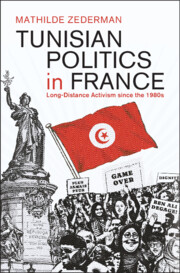Book contents
- Tunisian Politics in France
- Cambridge Middle East Studies
- Tunisian Politics in France
- Copyright page
- Contents
- Figures
- Acknowledgements
- Notes on Translation and Transliteration
- Chronology of Key Events
- Abbreviations
- 1 Introduction
- 2 Tunisian Politics in France
- 3 Constraints and Opportunities for Long-Distance Tunisian Activism
- 4 Anti-Ben Ali Politics from Afar
- 5 Anti-Regime Struggles and Immigrant Politics
- 6 Cross-Ideological Alliances and Entre-Soi
- 7 Conclusion
- Postscript
- Bibliography
- Index
- Series page
- References
Bibliography
Published online by Cambridge University Press: 24 October 2024
- Tunisian Politics in France
- Cambridge Middle East Studies
- Tunisian Politics in France
- Copyright page
- Contents
- Figures
- Acknowledgements
- Notes on Translation and Transliteration
- Chronology of Key Events
- Abbreviations
- 1 Introduction
- 2 Tunisian Politics in France
- 3 Constraints and Opportunities for Long-Distance Tunisian Activism
- 4 Anti-Ben Ali Politics from Afar
- 5 Anti-Regime Struggles and Immigrant Politics
- 6 Cross-Ideological Alliances and Entre-Soi
- 7 Conclusion
- Postscript
- Bibliography
- Index
- Series page
- References
- Type
- Chapter
- Information
- Tunisian Politics in FranceLong-Distance Activism since the 1980s, pp. 180 - 200Publisher: Cambridge University PressPrint publication year: 2024

